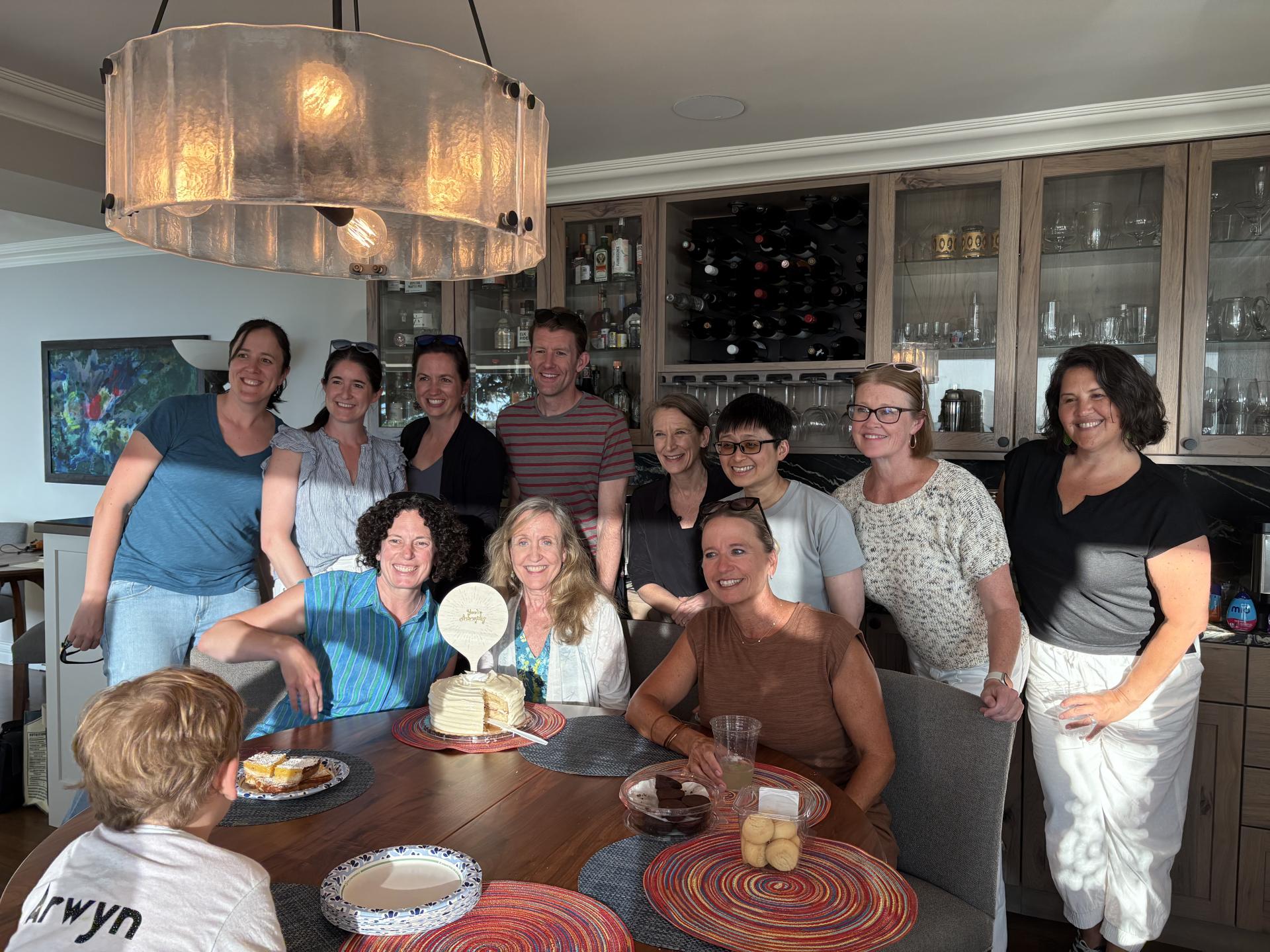
A 31-year career with the UW: Inspired by Family and Fueled by Passion

(Lisa Barton Diller, PT, MMSc in a UW sweatshirt on the right end with her students)
From gliding across the ice as a young figure skater to guiding patients on their path to recovery, Teaching Associate Lisa Barton Diller, PT, MMSc, has always brought a rare combination of discipline, grace, and compassion to everything she does.
Inspired by her mother’s passion as a registered nurse, Lisa found her calling in health care, channeling her love of movement and deep empathy into a remarkable, decades-long career in physical therapy.
From the earliest days, healthcare was in her blood. “My mom and aunt were nurses,” Diller recalls, “and I had a lot of exposure to her nursing friends. I even worked as a nursing assistant one summer before exploring physical therapy.”
Ultimately, she chose physical therapy for the flexibility it offered in both hours and settings—but it became so much more than a practical choice. It became her calling.
As she prepares to retire from routine teaching at the University of Washington, Lisa leaves behind an unmatched dedication, commitment to mentorship, and a profound impact on the countless lives she has helped heal, strengthen, and inspire.
Back when she started with the Department of Rehabilitation Medicine in 1994, Diller recalls using slide carousels and VCRs in the classroom. Since then, she has come a long way and takes great pride in her contributions as part of the teaching team at UW and beyond. What brought her the most joy was witnessing her students’ growth—from their first day to graduation—as they gained confidence and mastered their skills throughout the program.
Her early academic and clinical training took shape at Texas Woman’s University and later at Emory University, where she not only earned her advanced degree in Physical Therapy Clinical Neuroscience but also entered the field of teaching and clinical research via her mentor Steven Wolf, PhD, FAPTA. “At Emory, we were videotaped teaching and had to give and receive feedback—it was intimidating at first, but it helped me grow,” she added.
Diller’s research began at Emory, when she worked with stroke patients using surface EMG to retrain musculature. She also developed and taught continuing education courses for PT professionals in serial casting, functional electrical stimulation, motor learning, and wound care. Her written work appeared in several medical education textbooks.
That foundation led her to the physical therapy teaching clinic at the University of Puget Sound and later the physical therapy program at the University of Washington. Her first class came unexpectedly, filling in for a faculty member who had fallen ill.
It was the beginning of a decades-long chapter in which she shaped countless future clinicians. She became known not only for her clinical wisdom but also for her ability to mentor, adapt, and support.
For her colleagues, she is a professional and a good friend.
“She is so knowledgeable. She has a wealth of clinical expertise, and she cares so much about the students. She gives of her whole self to whatever she does in our division,” says Associate Professor Patricia Noritake Matsuda, PT, DPT, PhD.
Throughout it all, Diller’s focus has remained clear: the patient comes first. Listening to what patients want and need and designing treatment that’s both evidence-based and meaningful to them. That deep respect for patients extended naturally into her teaching.
“I think it’s all of our work,” Diller says, “We constantly update the information we teach with evidence-based practice, because things change all the time. I’ve been in practice long enough to know and experience those changes.”
Change, indeed, has been a constant in healthcare—and Diller always met it with thoughtful optimism. Over time, Diller watched healthcare evolve tremendously.
“I believe wearable technologies and teaching modules can help us extend our reach. Even if we can’t see patients regularly, we can give them tools and resources that support their care and help prevent issues like falls,” adds Diller.
Beyond the classroom and the clinic, her heart was always drawn to service. For Diller, it was always important to offer care to those who may not be able to afford it. Whether that’s in a public-school setting or through community outreach, giving back should be part of our professional identity.
“I’ve always practiced clinically alongside my teaching. Students see that what we cover in class is relevant in the clinic. That balance helped them feel confident that they could apply these skills in real life,” says Diller.
Diller also brought a sense of warmth and care to the department in quieter, more personal ways.
“She’s the one who brings snacks—yes, actual snacks—for her advisees. It’s the mom in her. She doesn’t just bring snacks—she brings encouragement, care, and a sense of home,” adds Matsuda.
When asked what she’ll miss most, Diller doesn't hesitate. “Mostly working with my team members and the students. I’ve enjoyed the mentoring, recognizing that everyone learns differently, and supporting each person through the program.”
For her colleagues, Diller is truly an inspiration. Someone whose dedication and effort cannot be expressed in words.
“She works tirelessly, and every year she meticulously updates her lectures with the latest evidence. She takes great pride in being a physical therapist and approaches her work with unmatched commitment and passion,” says Matsuda.
As she retires, Diller plans to continue her private practice and believes that physical therapists have a responsibility, like all healthcare professionals, to notice and communicate potential concerns—whether to the patient or their physician.
“Early detection matters. Put more emphasis on preventative screenings instead of waiting until someone is sick or injured. This is especially important for older adults, but it also applies to children with disabilities—many of whom receive extensive services as infants but may fall through the cracks as they grow older,” she adds.
Lastly, Diller adds: keep an open mind.
“I think I’ve always tried to do that—being open to opportunities and evaluating what fits best into my life. It’s important to remember that you’re not locked into one small role forever. Life changes, and sometimes your job or area of practice should change with it. If challenges arise or your interests shift, it’s okay to move on,” asserts Diller.

